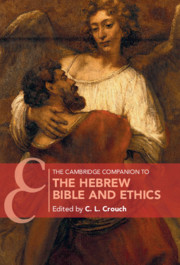Book contents
- The Cambridge Companion to the Hebrew Bible and Ethics
- Cambridge Companions to Religion
- The Cambridge Companion to the Hebrew Bible and Ethics
- Copyright page
- Dedication
- Contents
- Notes on Contributors
- Introduction
- Part I Legal Ethics
- 1 The Decalogue
- 2 The Talionic Principle and Its Calibrations
- 3 Community Violence in Deuteronomy
- 4 The Construction of Gender Roles in the Book of the Covenant and in Deuteronomy
- 5 Economics and the Law
- Part II Narrative Ethics
- Part III Prophetic Ethics
- Part IV Wisdom/Poetic Ethics
- Part V Faithful Ethics
- Index
- Cambridge Companions to Religion (continued from page iii)
- References
2 - The Talionic Principle and Its Calibrations
from Part I - Legal Ethics
Published online by Cambridge University Press: 05 February 2021
- The Cambridge Companion to the Hebrew Bible and Ethics
- Cambridge Companions to Religion
- The Cambridge Companion to the Hebrew Bible and Ethics
- Copyright page
- Dedication
- Contents
- Notes on Contributors
- Introduction
- Part I Legal Ethics
- 1 The Decalogue
- 2 The Talionic Principle and Its Calibrations
- 3 Community Violence in Deuteronomy
- 4 The Construction of Gender Roles in the Book of the Covenant and in Deuteronomy
- 5 Economics and the Law
- Part II Narrative Ethics
- Part III Prophetic Ethics
- Part IV Wisdom/Poetic Ethics
- Part V Faithful Ethics
- Index
- Cambridge Companions to Religion (continued from page iii)
- References
Summary
This essay will explore the pathways (or calibrations) of the talionic ‘eye for an eye’ principle in the Pentateuch from the cultural perspective of the ancient Hebrew scribes. In contemporary doctrine, rabbinic consensus remains characterised by a strident denial of any literal intent of this principle, where it is interpreted exclusively as a monetary fine. This consensus emerged, initially, as a reaction to charges made in the New Testament regarding the excessive literalism of the early Pharisaic sages. With the growth of Christianity and in the wake of the prejudice from the decrees of Hadrian (c. 135 CE), through to the massacres of the crusades – essentially until the present times – the constancy of this denial was inevitable. Leaving the legacy of this reception history aside, how did the principle of ‘eye for an eye’ attain such prominence in the Hebrew Bible?
- Type
- Chapter
- Information
- The Cambridge Companion to the Hebrew Bible and Ethics , pp. 23 - 35Publisher: Cambridge University PressPrint publication year: 2021
References
Further Reading
- 2
- Cited by



